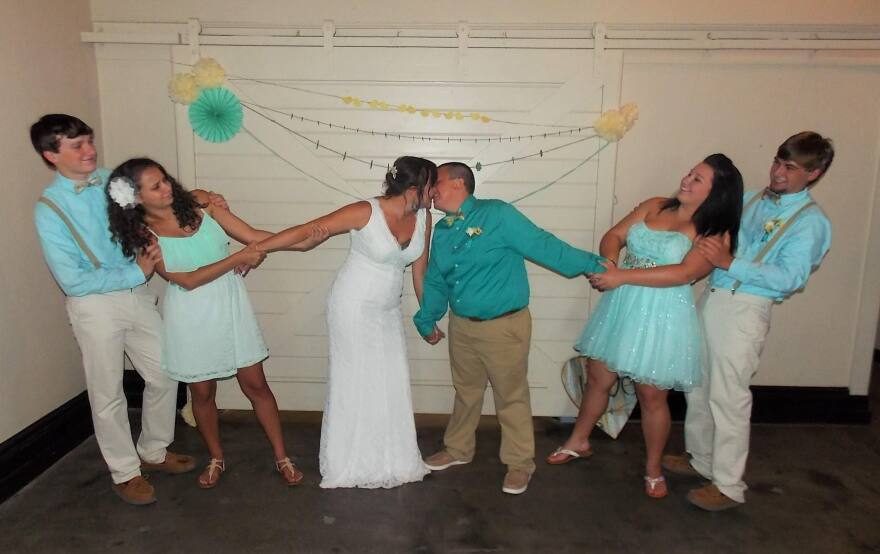Local author Julie Still-Rolin got the idea to write about her experience of coming out while on a book tour in 2018.
“I was on a tour for my last book … and one stop was at this small, volunteer-run LGBT bookstore and the audience had so many questions about growing up gay in the South,” she recalled.
So, she wrote “Coming Out in the South.” The book was released late last year and shares the story of how she came out in her early 30s after marriage and two kids.
Growing up in a religious household in Atmore, Ala., Still-Rolin believed that her attraction to women condemned her to hell. At 19, she married a man and had a baby and rationalized her attraction to woman as a “sin I could ask forgiveness for.” Being out was out of the question.
“The analogy of ‘coming out of the closet’ is very appropriate because you’re in a very dark place,” said Still-Rolin. “I was in an abusive relationship (with my husband). I wasn’t who I was supposed to be and I wasn’t with who I was meant to be with.”
Still-Rolin said she found an escape while commuting to University of South Alabama to earn her master’s degree in English. She lived a double life between college and home. When she met and fell in love with a woman — her longtime friend Alisa — her husband and her mother threatened to take away her children. She stayed married for 13 years before finally leaving. She credits a cancer scare for helping her turn her life around.
“In 2013, I had a breast cancer scare that turned out to be benign, but it made me re-evaluate my life,” Still-Rolin said. “I was 31 and thought ‘Am I doing what I want to be doing?’”
After an ugly divorce, Still-Rolin found her “happily ever after” with Alisa. The two merged their lives and kids together to create their own modern family, but Still-Rolin found that living out and proud wasn’t easy.
Still-Rolin said her mother never accepted her new life and even tried to host an intervention, hoping to change her daughter’s sexuality.
She often used the term “queer” to describe her daughter. While the term is now largely accepted as an umbrella term to describe sexual and gender identities, Still-Rolin said she knows her mother always meant it as an insult.
“She came over to my house one day and asked me if I was queer and then asked if I believed in God,” Still-Rolin said. “I said ‘Not your God.’ She cried and said something to the effect of ‘I can love you but I can’t be your mother.’ And then she walked out of my kitchen.”
That was 2014. Her mother hasn’t contacted her since. As for her father, Still-Rolin said she’s had a complicated relationship with him since her parents divorced when she was a kid. When she told him she was getting married to Alisa, he was ambivalent.
“He shrugged his shoulders and said, ‘Are you sure about that?’,” recalled Still-Rolin. “At our wedding, I remember looking around and seeing all of Alisa’s family and just two of my family members. I thought, ‘I’d be all alone if it wasn’t for her.’”

Coming out to her kids was perhaps easier.
“My daughter had come home from school one day and just said ‘You’re gay, aren’t you?’ and then she just hugged me,” said Still-Rolin.
In 2017, Still-Rolin moved to Pensacola where she started Evolve ‘n Thrive, an LGBTQ+ event hosting nonprofit. These spaces and events are important in smaller communities where LGBTQ people — especially young people — may not have support at home. According to the Human Rights Campaign, LGBTQ youth comprise up to 40% of the U.S. homeless youth population.
After hiding in the closet, and then losing her family and a job after coming out, Still-Rolin said she’s had people ask why she stays in the South.
“It’s my home,” she said. “I want to be here to help make the change.”
While the LGBTQ movement has come a long way since the Stonewall riots which occured 51 years ago this month, there’s still more work to be done, said Still-Rolin. In 2017, the Supreme Court struck down bans on same-sex marriage, and earlier this month, the court ruled that language in the Civil Rights Act of 1964 protects gay and transgender people form workplace bias. Last year the House passed the Equality Act which extends civil rights laws to explicitly include sexual orientation and gender identity. The bill remains in the Senate.
Before the pandemic hit, Still-Rolin was out promoting her book where she heard from people who were afraid and faced their own discrimination.
“One woman — she’s 65 years old and she’s still not out to her family,” said Still-Rolin. “She’s afraid her children will disown her and not let her see her grandchildren.”
When it’s appropriate, Still-Rolin said she wants to continue her book tour to meet people and share her stories. In the meantime, she hopes her book provides some comfort to those who might still be struggling.
“What we think will destroy us often makes us better,” she said. “You learn to create your own path, and you find a whole new big gay family.”


